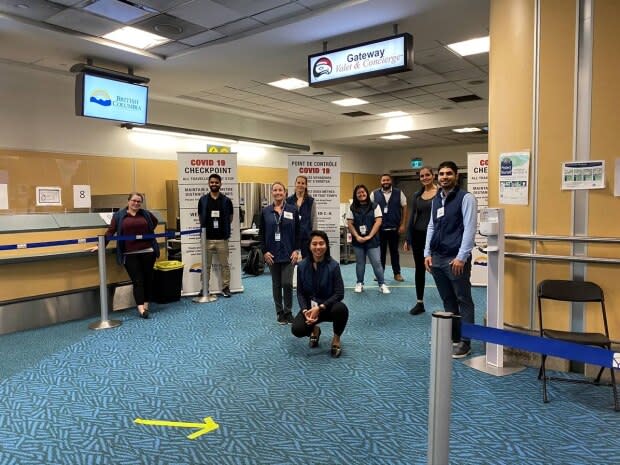Hundreds of B.C. government staff redeployed as quarantine officers at border crossings
The B.C. government has quietly redeployed hundreds of its own employees to serve as de-facto quarantine officers at all of British Columbia's international border crossings.
The province put out a call for volunteers from within after the Trudeau government announced in late March it would be closing the Canada-U.S. border to non-essential travel.
In early April, B.C. came up with its own plan to screen travellers from abroad and enforce, at the point of entry, the federal 14-day self-isolation order under the Quarantine Act.
"The premier was clear for many, weeks that he wanted to see more action at the border," said North Delta MLA Ravi Kahlon. "John Horgan simply said, 'Listen, we're just going to do it.'"
"This kind of program is not normal for us at a provincial government level." - NDP MLA Ravi Kahlon
Within five days, a program was mobilized to send teams of provincial staffers from all corners of government to YVR and all seven land crossings to do the job themselves.
A call went out to all B.C. civil servants asking who would be willing to go. Nearly 1,000 raised their hands. The province has been rotating through teams of volunteers ever since.
"I was surprised to see that many people respond," said Kahlon, who's tasked with overseeing the program for the NDP. "This kind of program is not normal for us at a provincial government level."

Staff from the Lower Mainland, Vancouver Island and as far away as Prince George, involving a cross-section of ministries, have participated in the past six weeks.
The teams are stationed beyond the CBSA checkpoints as the last stop for travellers entering B.C. They're required to fill out a detailed declaration form and verbally present their self-isolation plans to the quarantine officers.
If deemed sufficient, travellers are allowed to proceed straight home. If not, they're escorted to a nearby hotel where they're placed under government-mandated quarantine for two weeks.
'Welcome home'
Katrina Estoque has worked for the B.C. government for 13 years, currently as the business management co-ordinator under the Ministry of Transportation.
But these days, she's overseeing YVR's self-isolation checkpoint teams. They shift their schedules around incoming international arrivals, some of them repatriation flights, and screen anywhere between 300 and 900 passengers per day.
"A lot of them are coming from places that were in lockdown and they haven't been in Canada for three or four months, so it means so much to them just to hear someone say 'welcome home.'"
"I have been here since day one; it's been an amazing experience overall," - Katrina Estoque, B.C. quarantine officer
Estoque, 32, commutes to the airport from Coquitlam every day. She was one of the first employees tapped to help mobilize the program and now trains other volunteer staff who rotate through YVR.
"I have been here since day one; it's been an amazing experience overall," she said.
The teams are trained to screen passengers in detail, ensuring every person setting foot in British Columbia has the means — and the intention — to self-isolate as required for the full 14 days.
"We ask them where they're going to stay, if they live with someone who is elderly or immune-compromised, how they're going to get home, how food and medication will be delivered to their home," she said. "Basically, just making sure they have a very sound plan before we send them on their way."

Since the travel restrictions were put in place, 31,000 people have been screened at B.C.'s land crossings; 25,000 have come through the airport.
Of that number, 137 did not present sufficient self-isolation plans and were immediately put into a taxi and taken to a nearby hotel to serve their quarantine.
Around 40,000 follow-up calls have been placed to returning travellers after they've arrived home to make sure they're complying, says the provincial government. Several hundred who didn't respond have had a knock on their door from local police.
Overall, 100 people have developed symptoms while self-isolating. The province plans to continue the program as long as the border remains closed to non-essential travel.


